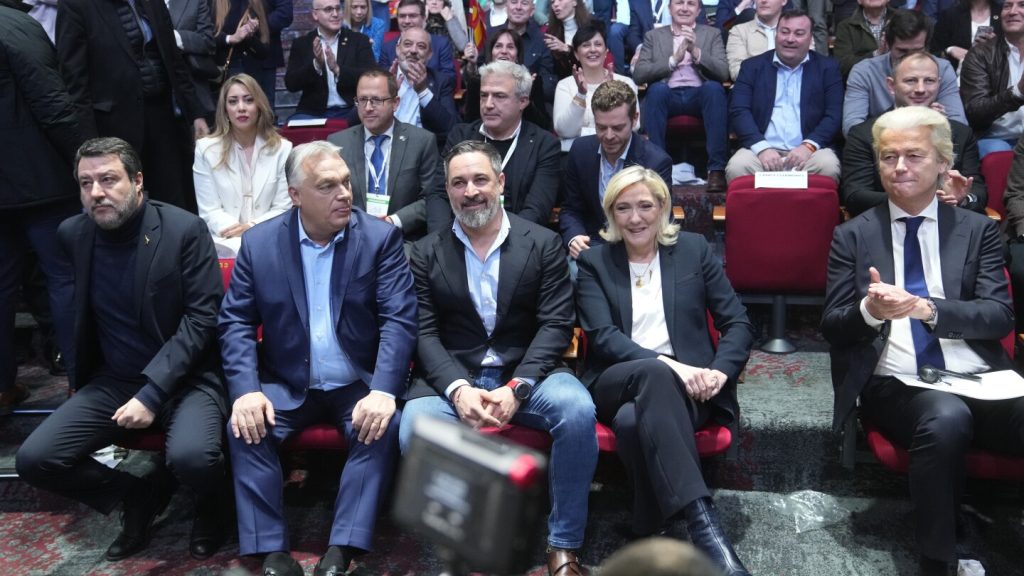Far-Right Leaders in Madrid Rally Behind Trump and Call for Europe’s Renewal
Introduction: A Gathering of Far-Right Leaders in Madrid
On a contentious Saturday in Madrid, a significant gathering of Europe’s far-right political leaders took place, organized by Spain’s Vox party under the slogan “Make Europe Great Again.” The event brought together prominent figures such as Hungarian Prime Minister Viktor Orbán, Italy’s Deputy Premier Matteo Salvini, French National Rally party leader Marine Le Pen, and Vox president Santiago Abascal, among others. These leaders used the platform to commend U.S. President Donald Trump’s agenda and to project a vision of Europe at a crossroads. The event was not just a show of solidarity but also a call to action for a continent that, in their view, is in dire need of renewal.
The rally highlighted the growing influence of far-right ideologies across Europe, with speakers emphasizing themes of economic nationalism, border control, and a rejection of the European Union’s current trajectory. The event also underscored the deepening ties between Europe’s far-right and Trump’s America, with many expressing hope that Trump’s re-election could usher in a new era of transatlantic cooperation aligned with their values.
Downplaying Trade Tensions and Criticizing EU Policies
While the event was largely focused on the ideological alignment between Trump and Europe’s far-right, some practical economic concerns were also addressed. Salvini and Abascal downplayed the potential threat of Trump’s tariffs on European imports, arguing that the greater danger to Europe’s prosperity lies in the EU’s own policies. Abascal declared, “The great tariff is the Green Deal and the confiscatory taxes of Brussels and socialist governments across Europe.” This statement encapsulated a central theme of the gathering: the belief that the EU’s regulatory and environmental policies are stifling economic growth and undermining national sovereignty.
Salvini, known for his populist rhetoric, also seized the opportunity to criticize the current German government under Chancellor Olaf Scholz, describing it as the “most disastrous government of the post-war period.” He claimed that Germany, once the engine of Europe, has come to a halt under Scholz’s leadership. Salvini’s remarks were not merely a critique of Germany’s policies but also a broader indictment of the EU’s direction. He pointed to the upcoming German elections, scheduled for February 23, as a “historic opportunity” for the far-right Alternative for Germany (AfD) party, which is currently polling in second place. Salvini’s comments reflected the broader sentiment of the event: that Europe is at a turning point, and the far-right is poised to seize the moment.
Immigration and Border Security: A Unifying Issue
One of the most unifying themes among the speakers was the issue of immigration and border security. Despite data from Frontex, the EU’s border control agency, showing a sharp decline in irregular border crossings into the EU in 2024, the leaders framed immigration as a critical challenge facing the continent. Each speaker emphasized the need to defend Europe’s borders against illegal immigration, framing it as a matter of national sovereignty and cultural preservation.
This rhetoric resonated strongly with the audience, as immigration has long been a rallying cry for far-right movements across Europe. The speakers argued that the EU’s failure to adequately address the issue has left member states vulnerable andCreated divisions among nations. The call for stricter border controls and a return to national sovereignty over immigration policy was presented as a necessary step to restore security and stability to the continent.
Europe’s Technological Lag and the Need for Renewal
In addition to economic and immigration-related issues, the gathered leaders also highlighted Europe’s perceived lag in technological advancement as a pressing concern. Marine Le Pen, in particular, criticized the EU for leaving the continent on the margins of global technological revolutions, such as advancements in artificial intelligence. She argued that the EU’s bureaucratic and regulatory frameworks are stifling innovation and preventing Europe from competing effectively on the global stage.
Le Pen’s remarks were part of a broader narrative that positioned the far-right as the only viable force capable of restoring Europe’s global influence. She emphasized the importance of the Patriots for Europe group, which currently holds 84 seats in the European Parliament, as the only leaders capable of working effectively with the new Trump administration. “We are the only ones that can talk with the new Trump administration,” Le Pen declared, framing the far-right as the bridge between Europe and a resurgent America under Trump.
Conclusion: A Vision of Europe at a Crossroads
The Madrid gathering was more than just a political rally; it was a declaration of intent from Europe’s far-right leaders. They presented themselves as the vanguard of a movement determined to challenge the status quo and chart a new course for the continent. While their policies and rhetoric have sparked intense debate and opposition, there is no doubt that the far-right is gaining momentum across Europe.
The event also underscored the deepening transatlantic ties between Europe’s far-right and Trump’s America. Speakers repeatedly referenced Trump’s election as a “real change” that presents Europe with an opportunity to break free from the constraints of the EU and embrace a more populist, nationalist agenda. Whether this vision of Europe’s future will prevail remains to be seen, but one thing is clear: the far-right is no longer on the fringes of European politics—it is increasingly shaping the continent’s political landscape.












